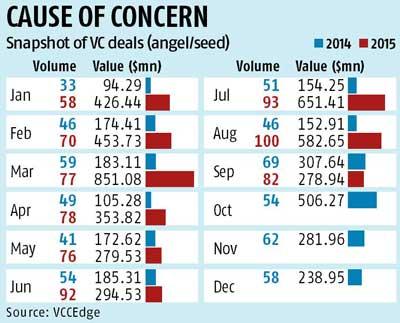 | « Back to article | Print this article |
Deal values have been falling steadily since May this year, when it touched a high of $851 million.
 When Nikesh Arora of SoftBank said in August that start-up valuations were ahead of reality, he was echoing the concern of investors and capturing the change in sentiment in India's e-commerce sector.
When Nikesh Arora of SoftBank said in August that start-up valuations were ahead of reality, he was echoing the concern of investors and capturing the change in sentiment in India's e-commerce sector.
Other investors said they were pausing and expecting a slow correction.
The correction may have already started. Fund-raising for start-ups is fast drying up.
The number of venture capital deals in a week has fallen sharply in the past four-six weeks, show data sourced from VCCEdge, the financial research platform of VCCircle.com.
Here's an analysis of the money raised in the past seven weeks till October 2. Deal values fell in five out of seven weeks, falling 40-50 per cent in five weeks and going up 42 and 160 per cent in two weeks.
Investors will tell you not to read too much into weekly numbers, as they can fluctuate. Deals may get clubbed in a week, while some are announced later, or could be a function of the summer vacation in the US.
The monthly numbers show a similar trend. Deal values have been falling steadily since May this year, when it touched a high of $851 million.
Except for July and August, when it spiked to $651 million and $582 million, deal values have been falling.
Yet, most investors would go by quarterly figures, which continues to show a rise but they don't deny the underlying trend.
The reasons for the slowdown are manifold. ''With the massive correction in stock prices in China and the US, and the impending Fed rate hike, the hedge funds are reassessing their risks," says an executive at venture capital firm SAIF Partners.
''The public markets are their bread and butter and they would like to devote their energy and focus on them," he says.
Some of these investors - Falcon Edge Capital, Maverick Capital, Tybourne Capital and Steadview Capital - have been writing big cheques for e-commerce firms in India.
Hedge funds, investment firms and asset managers have pumped $3.8 billion into 26 Indian technology and e-commerce start-ups since the start of last year, according to data compiled by Bengaluru-based analytics firm Tracxn, reported Bloomberg in May.
''The meltdown in China has hurt these investors, as it has eroded their portfolios. They are now looking to invest in liquid assets,'' says Alok Mittal, the former India head of Canaan Partners.
As a result, the number of players available to write large cheques goes down.
''Everyone is taking stock, and closely evaluating companies, business models, and unit economics,'' says an executive with a VC firm.
Start-ups don't reach home run (scale-up) in one round; they need multiple rounds. Investors want to know if they will be comfortable in investing in a firm in multiple rounds or will other investors find this firm attractive enough.
There's a feeling that Indian venture space is overheated, says Mittal.
''People have been investing at a heightened pace. They need to take a back seat and see how their portfolios are doing... In many segments, there are multiple players and no breakthroughs,'' says Nikhil Khatau, co-founder and managing partner, Mayfield Advisors, an early stage VC firm.
According to VCCEdge, Indian start-ups attracted $1.4 billion between June and September 2015, 140 per cent more than the same quarter last year.
''Too much capital has come in; investors need to be careful,'' adds Milttal. Most investors have taken some bet or the other in themes like hyper local services and don't want to take more bets in the same space.
Many fear we could be a repeat of crunch in Series-A/B fund-raising seen a couple years back.
''I see a contraction in the $30-50 million range... When late stage deals dry up, there will be a trickle effect on early-stage deals,'' says Mittal. ''That has to come back as not all seed-funded ventures will be able to raise a series-A round,'' says another venture capital investor.
 Only two out 10 firms who raise seed money are able to raise Series-A funding.
Only two out 10 firms who raise seed money are able to raise Series-A funding.
The problem is if 10 companies were getting seed-funded earlier, that figure is 100 today. So, the number of companies who may not graduate to Series-A level would be a fairly large number now.
Investors say when capital was available freely, there was more relaxation in the benchmarks. But with capital getting scare, only the top companies will get funded, which explains the noise around profitability.
But if a good deal comes to the table (read: great promoter, large opportunity, little competition, and ability to scale up quickly), there will be no dearth of investors, says Khatau of Mayfield.
For now, the crunch is hurting start-ups. A start-up founder has been trying to raise just Rs 2 crore ($350,000) for a month or more and didn't want to be identified.
A year back, many of his founder friends raised money much more easily.